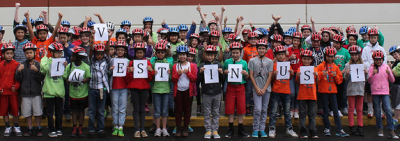What antiracism work has meant for us
By Rob Sadowsky, December 9 2015
“I love Portland. But, in all honesty, I could never live here. It’s just too white,” shared Jessica Vazquez Torres, organizer/trainer at Crossroads Antiracism Organizing & Training.
These words echoed over and over again for days after I completed The Intertwine Alliance’s three-day intensive antiracism workshop led by Crosroads and sponsored by the U.S. Fish & Wildlife Service Urban Wildlife Conservation Program. I love Portland, but these words make me angry and sad, to know that persons of color do not feel welcome in a city I care about so much. I’ve been committed to fighting oppression and inequities all my adult life. I’ve lived in Chicago, where racism exists in so many forms, but where you’d never have heard Jessica’s statement.
 I went to the workshop in October along with two co-workers to do some unpacking, and unpacking is what we did. We examined the history of institutional racism in the United States from before colonialism through today, analyzing how it’s still deeply embedded in Portland’s institutions big and small. We looked internally at ourselves as individuals and at the organizations for which we work. This work is hard – and also vital to making sure that Jessica comes back some day and sees a Portland that she indeed would love to live in and would thrive within.
I went to the workshop in October along with two co-workers to do some unpacking, and unpacking is what we did. We examined the history of institutional racism in the United States from before colonialism through today, analyzing how it’s still deeply embedded in Portland’s institutions big and small. We looked internally at ourselves as individuals and at the organizations for which we work. This work is hard – and also vital to making sure that Jessica comes back some day and sees a Portland that she indeed would love to live in and would thrive within.
The work of any non-profit is complicated, filled with perpetual challenges, and everyone seems to have one more thing they want to put on your plate. Yet we know that our mission actually depends on our ability to break through our own institutional racism and build for both a multicultural city and a multicultural Bicycle Transportation Alliance. The future demographics of Portland bear out a clear path toward multiculturalism. More than 40 percent of youth in Portland’s schools are people of color. Our mission cannot succeed if we do not address historical inequities and build a broader movement.
At our core mission, the Bicycle Transportation Alliance is concerned with healthy streets and neighborhoods where we can easily choose to bicycle. But we cannot afford for inequities to persist within our transportation network and for an increasingly smaller percentage of our community members to share in community prosperity. So that brought us to embrace the work that led us to this workshop. It started with entering The Intertwine Alliance’s antiracism cohort with nine other regional environmental organizations. We embarked on an eight-month process of evaluating our organization -- hard work with already full plates.
 Yet we move along. The Bicycle Transportation Alliance now has a clear racial equity policy statement that our board approved in October. We have an equity committee that consists of board, staff and outside participants helping to reshape the organization internally and externally. Some examples of external changes have been deepening our partnerships with community-based organizations and collaborating on grant proposals where funding goes directly to our partners to engage in our work. We no longer simply expect partners to join our team and our campaigns without adequate reimbursement for their time and staffing.
Yet we move along. The Bicycle Transportation Alliance now has a clear racial equity policy statement that our board approved in October. We have an equity committee that consists of board, staff and outside participants helping to reshape the organization internally and externally. Some examples of external changes have been deepening our partnerships with community-based organizations and collaborating on grant proposals where funding goes directly to our partners to engage in our work. We no longer simply expect partners to join our team and our campaigns without adequate reimbursement for their time and staffing.
We are examining everything. Budget. Staffing. Allocation of staff resources. Language. Images. Stories. Processes. Training. Locations. Food. Music. Signs. Office décor. Again, all hard work with full plates. But honestly, everyone at the organization -- staff and board -- have enthusiastically embraced this challenge without complaining about the full plates. The only complaint is that everyone wants it to happen quicker – actually, right now! But this work takes time, and it takes the effort to listen. We need to listen with open ears to our partners, to our members, to stakeholders, and to outside provocateurs that want us to do right and get better. To all of you: thank you. Thank you for being honest, open and sometimes brutally open and honest. We need it.
One of the great things about both the cohort and the intensive training workshop is going through the work with peers. It has allowed us to bounce ideas back and forth with folks we see all the time. The peer-based approach also raises the accountability bar just a bit higher, as well. All of this work at the Bicycle Transportation Alliance is something we are willing to share with others. Please give us a shout if you want to see the outcomes. We can share our stories, as well.
Join us by starting your own work, and let’s fight together so that all of Portland’s citizens feel welcome, and so that visitors will see how much every neighborhood in Portland can thrive.

 Rob Sadowsky joined the Bicycle Transportation Alliance as executive director in June 2010. Previously, he served as executive director of the Active Transportation Alliance in Chicago, Illinois, for six years, from 2004 to 2010. He has more than 25 years of nonprofit advocacy and management experience, working on issues of affordable housing, community economic development and transportation policy. Just like riding a bike, the ride is as important as the destination.
Rob Sadowsky joined the Bicycle Transportation Alliance as executive director in June 2010. Previously, he served as executive director of the Active Transportation Alliance in Chicago, Illinois, for six years, from 2004 to 2010. He has more than 25 years of nonprofit advocacy and management experience, working on issues of affordable housing, community economic development and transportation policy. Just like riding a bike, the ride is as important as the destination.
Comments
would love to talk more about this
Add new comment